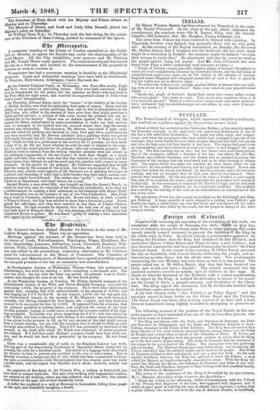Ebt Metropolis.
A numerous meeting of the Livery of London assembled in the Guild- hall on Monday, to oppose the Income-tax, under the chairmanship of the Lord Mayor. All the City notabilities were present; and Mr. Pattison and Mr. Joseph Hume made speeches. The resolutions adopted denounced the tax as a war-tax, and insisted on the abandonment of the proposal to increase or even to continue it.
Westminster has had a numerous meeting in hostility to the Ministerial proposals. Large and influential meetings have been held in Southwark, et, Pancras, Marylebone, Aldersgate, Castle Baynard, &c.
At the Central Criminal Court, on Wednesday, two Post-office clerks, Eagle and Steel, were tried for purloining letters. They were both convicted. Eagle is to be transported for ten years; but the sentence on Steel—who had been in the Post-office for eight years, and received the augmented salary of 1101.—was twelve years' transportation.
On Thursday, Edward Rixon, lately the "keeper" of the Gallery of the Society of British Artists, was tried for embezzling four sums of money. Risen had the selling of the pictures; certain paintings were sold by him to prizeholders in the Art-Uniop, who added to the amount of their prize that they might purchase a higher-priced picture- a portion of this extra money the prisoner had not ac- wanted for to the Society. There was no defence against the facts; but the counsel for Risen endeavoured by cross-examination to make out that matters were so managed at the Gallery that the accused might have kept the money without any criminality. The treasurer, Mr. Stevens, was asked if large sums were not asked for pictures and declared to have been paid when small amounts only were received; and Mr. Stevens admitted that a painting which was priced 300E really brought but 371. The witness said he had painted "A Head of a Greek Boy," which he sold to a gentleman in the country for 17 guineas; he then made a copy of it; he did not know whether he sent the copy or original to the coun- try; he sold the second picture for 10 guineas: this was acommon practice. Mr. Clarkson tried to extract from the witness whether pictures were not stated in the catalogue [apparently of the Art-Union] to have been bought at a much higher rate than they really were: but this was objected to, as irrelevant, and the counsel gave way; though he said he could put the question with respect to many instances. In his speech for the prisoner, Mr. Clarkson suggested that he had kept the sums by the consent of the artists: but there was no proof of this. The Recorder said, nobody could approve of Mr: Stevens's act of painting two copies of a picture and disposing of both: had a little farther step been taken, serious con- sequences might have followed. The verdict was "guilty"; and Rixon was sen- tenced to be imprisoned, with hard labour, for a year. Samuel Brown, a man about fifty, was brought up from the Queen's Bench, to which he had been sent for contempt of the Chancery jurisdiction, to be tried for &misdemeanour for making a false statement on his marriage with Hester Field. The prosecution was at the instance of one of the Vice-Chancellors. Miss Field was a ward in Chancery, eighteen years old; Brown had been, in 1840, a butler in Wimpole Street; the lady was entitled to more than a thousand a year. Brown ed her affections; and they were married in last June, at Thrifty Church, lalylebone.. On that occasion he declared that the lady was of age, and that they both lived in Wimpole Street. For this marriage the Court of Chancery had committed Brown'
rown to prison. He was found "guilty of making a false statement rah regard to his residence." s s


























 Previous page
Previous page